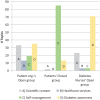What Are Diabetes Patients Versus Health Care Personnel Discussing on Social Media?
- PMID: 30636445
- PMCID: PMC6399792
- DOI: 10.1177/1932296818821649
What Are Diabetes Patients Versus Health Care Personnel Discussing on Social Media?
Abstract
Background: Use of social media is increasing rapidly, also in health care and diabetes. However, patients, health care personnel, and patient organizations discuss diabetes on social media very differently. This has led to a lack of common ground when these stakeholders communicate about diabetes and a gap in understanding one another's point of view. Social media have a potential for improved communication if each stakeholder group knows about, acknowledges, and accepts one another's perspective.
Method: We extracted and analyzed posts from three Norwegian Facebook groups representing patients, patients' organization, and health care personnel. Qualitative content analysis was done to find the distribution of main categories, followed by a thematic analysis of subcategories that were posted and discussed.
Results: The patient organization's posts are the most equally distributed over the four main identified categories: scientific content, health care services, self-management, and diabetes awareness. The closed patient group's posts were dominated by self-management; the open diabetes nurses' group was dominated by diabetes awareness. The three social media groups differed substantially in what and how they posted and discussed within the main topics. The nurses' open group had percentage-wise both the most liked and commented post, and the posts on self-management had the highest average number of comments.
Conclusions: There is a big discrepancy in posted information and discussions on social media, between patient closed group, patient organization open group, and health care personnel open group. To reach the aim of using social media for better health, there is a need for more information of what is posted and discussed in the other groups, to harmonize and ensure safe and accurate dissemination of information.
Keywords: Facebook; diabetes; qualitative content analysis; social media; social networking; thematic analysis.
Conflict of interest statement
Figures
References
Publication types
MeSH terms
LinkOut - more resources
Full Text Sources
Medical
Miscellaneous


